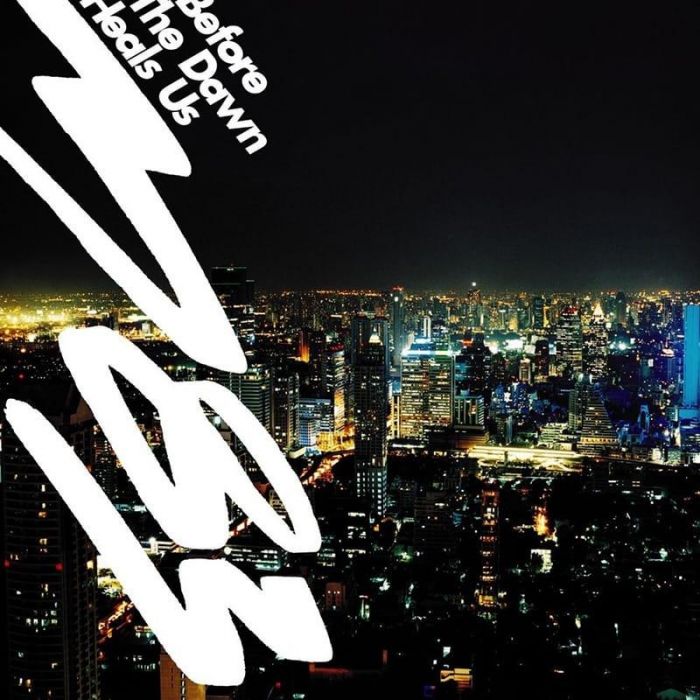Before the Dawn Heals Us by M83 (Review)

I’ve made it no secret that my impressions of M83’s previous album, Dead Cities, Red Seas & Lost Ghosts, have been lukewarm at best. People have fallen all over themselves to sing the album’s praises (Pitchfork, I’m looking in your general direction), piling accolade after accolade onto the band’s towering arrays of guitars and analog synths. Granted, the disc sounds impressive — at first. However, it begins to sound a little too hollow and obvious after repeated listens. It’s as if the duo does everything within their power to convince people that their music is “big” and “epic,” an attempt that often feels cold, distant, and predictable to me.
Which is why it’s nice to hear the band (now reduced to just Anthony Gonzalez) opt for a warmer, more organic sound on Before the Dawn Heals Us. The parts that were strongest on Dead Cities… were those where the duo relaxed a little bit and let the listener peek behind the curtain, so to speak. When they let down their guard and stopped trying to bombard the listener with wave after metallic wave of sound.
Unfortunately, Before the Dawn Heals Us is flawed in other ways. While the more organic approach certainly has its advantages, it also means that the album often lacks focus, resulting in a disc that is just as spotty and uneven as its predecessor… just differently.
“Moonchild” and “Don’t Save Us From the Flames” pick up right where Dead Cities… left off, with the same sort of bombast that one finds in tracks like “Unrecorded” and “Run Into Flowers” — albeit in a slightly more refined form. On “Moonchild,” after a somewhat precious vocal intro courtesy of Kate Moran (“Keep on singing little boy, and raise your arms to the big black sky. Raise your arms the highest you can, so the whole universe will glow.”), castrati vocals and metallic guitars do their best to punch a hole in the stratosphere. “Don’t Save Us From the Flames” is the album’s most intense track, its rapid-fire drumming and breakneck guitars tearing along like a Swervedriver track with its brakelines cut.
After the opening one-two punch, the album calms down and reveals its strongest suite of tracks. “In the Cold I’m Standing” is a fairly basic track with oceanic swells of distorted guitar and sad synthlines. Despite its fairly familiar nature, it has the same sort of enveloping effect as Sigur Rós.
“Farewell/Goodbye” is easily the album’s strongest track, as well as the strongest track yet produced by the band simply because it’s so, well, un-M83ish. Rather, it sounds more akin to their fellow countrymen in Air. The warm, bubbling analog synth-work, wist-inducing melodies, vocoderized croon, and overly romantic-yet-oh so perfect lyrics (“I’ll write my love on more than a thousand weeping willows”) might be a bit too far on the soft-rock end of the spectrum for some, but I love it. It’s a nice change of pace, and it’s here that M83’s more organic approach becomes most apparent.
“I Guess I’m Floating” continues this direction, with sparse guitars plucked over soft synth swells and the sounds of children at play. As the title might imply, it’s a rather mellow track, and one that could easily last well beyond it’s short runtime without becoming too saccharine. Meanwhile, “Teen Angst” meanders back towards more bombastic territory, with pummeling synth drums rising from up beneath building synths to explode in a short, nova-like burst of dreamy vocals.
Unfortunately, the album’s final third or so begins to sputter, meandering around with several dubious, even groan-worthy tracks. “Safe” begins the slow descent, an extremely mawkish piano ballad that finally disappears into the sounds of kids exclaiming while they watch fireworks explode overhead. It’s the perfect sentiment for M83, who try so hard to infect their music with a sense of wonder and magic, and yet never quite seem to do so.
Actually, now that I think about it, the track itself might not be so bad except that it’s precedes “Car Chase Terror!,” a track so bad that it manages to drag down much of the surrounding album. The song doesn’t work on paper — M83 provides the soundtrack while Kate Moran recites Z-grade slasher movie dialog, pretending to be a mother and daughter who console each other as they drive away from a pursuing murderer — and it sounds even worse when you actually hear it. And Gonzalez lets loose with his inner shredder on “A Guitar And A Heart,” whipping out some hard rocking guitar riffs that sound like equal parts Van Halen and Daft Punk (think “Digital Love”) and just banging away at the same progression for minutes on end.
The album ends on a somewhat more spectacular note, with “Lower Your Eyelids to Die With the Sun,” which, with its angelic choirs, fairy-like vocal pips, silvery layers, and booming tympani, actually manages to live up to the pomp and circumstance that it surrounds itself with.
Is Before the Dawn Heals Us a bad album? No, but it is definitely a flawed one. I’m still don’t understand the hype and acclaim that surrounds M83, but Before the Dawn Heals Us contains several moments in which I can almost perceive a time when I might. However, the rest of the album proves that they’ve still got a ways to go.